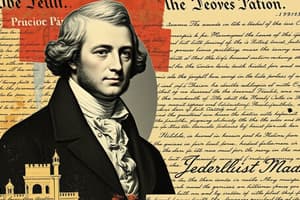Podcast
Questions and Answers
What was the main concern of the Anti-Federalists regarding the Constitution?
What was the main concern of the Anti-Federalists regarding the Constitution?
- It would create a powerful national government that could abuse power. (correct)
- It failed to address the needs of the common people.
- It gave too much power to the states.
- It lacked a strong central government to address national issues.
Which of the following is NOT a potential issue resulting from conflicting state and federal laws, as highlighted in the text?
Which of the following is NOT a potential issue resulting from conflicting state and federal laws, as highlighted in the text?
- Reduced economic activity due to uncertainty in the legal environment.
- Erosion of the federal government's ability to enforce its laws.
- Increased national unity due to independent state actions. (correct)
- Confusion and inconsistencies in the application of laws.
What was the primary reason Federalists supported the Constitution?
What was the primary reason Federalists supported the Constitution?
- They feared the potential for the masses to gain too much political power.
- They believed in a strong central government to address the weaknesses of the Articles of Confederation. (correct)
- They wanted to ensure individual liberties were protected.
- They sought to promote economic growth by regulating interstate trade.
Based on the text, what historical event exemplified the potential dangers of too much power in the hands of the masses for Federalists?
Based on the text, what historical event exemplified the potential dangers of too much power in the hands of the masses for Federalists?
What is the main argument for a strong central government according to the text?
What is the main argument for a strong central government according to the text?
Which of the following could be considered a potential consequence of conflicting laws between states and the federal government?
Which of the following could be considered a potential consequence of conflicting laws between states and the federal government?
Which of the following best illustrates the issue of "weakening national unity" as a result of conflicting state and federal laws?
Which of the following best illustrates the issue of "weakening national unity" as a result of conflicting state and federal laws?
Which of the following is a primary concern of Anti-Federalists, as discussed in the text?
Which of the following is a primary concern of Anti-Federalists, as discussed in the text?
Flashcards
Federalists
Federalists
Supporters of the Constitution who believed in a strong central government.
Anti-Federalists
Anti-Federalists
Opponents of the Constitution who feared a strong national government.
Shay's Rebellion
Shay's Rebellion
An uprising that highlighted weaknesses of the Articles of Confederation.
Conflicting Laws
Conflicting Laws
Signup and view all the flashcards
National Unity
National Unity
Signup and view all the flashcards
Erosion of Federal Authority
Erosion of Federal Authority
Signup and view all the flashcards
Economic Disruptions
Economic Disruptions
Signup and view all the flashcards
Legal Uncertainty
Legal Uncertainty
Signup and view all the flashcards
Study Notes
Federalist vs. Anti-Federalist Views
- Federalists supported the Constitution, recognizing the 1780s' issues stemmed from the Articles of Confederation's weaknesses.
- Federalists believed the greatest threat was too much democracy and power in the hands of the masses, citing Shays' Rebellion as an example.
- Anti-Federalists opposed the Constitution, fearing a strong national government would limit individual liberties.
- Anti-Federalists worried the government might favor the wealthy, overriding the common people's needs.
- Anti-Federalists believed the greatest threat was the government becoming tyrannical.
Potential Issues of Conflicting State and Federal Laws
- Confusion and Conflict: Inconsistent application of laws due to conflicting state and federal regulations could create confusion for citizens, businesses, and law enforcement.
- Weakening National Unity: Independent state policies—especially on important issues like civil rights, taxes, and trade—could lead to division rather than unity.
- Erosion of Federal Authority: Ignoring federal laws would diminish the central government's power and effectiveness, potentially creating instability.
- Economic Disruptions: Conflicting state and federal regulations on trade, taxes, and tariffs could disrupt interstate commerce and economic activities.
- Legal Uncertainty: Lack of clarity between state and federal laws could lead to endless legal disputes, slowing down justice and discouraging investment.
Importance of a Strong Central Government
- A strong central government is crucial to ensuring consistent laws, protecting the rule of law, and fostering national unity.
Studying That Suits You
Use AI to generate personalized quizzes and flashcards to suit your learning preferences.




